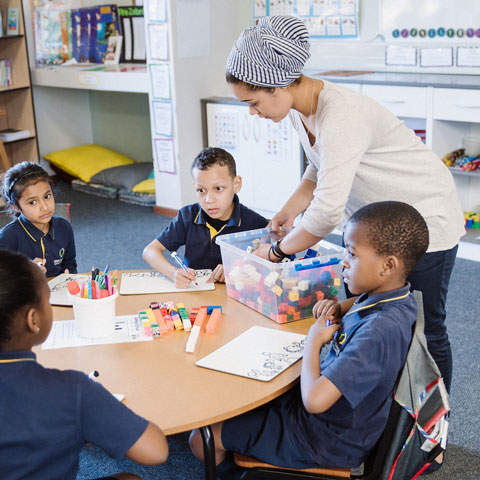As children grow in their early childhood years and enter pre-primary school, their world begins to open up. They want to explore and frequently ask about the things around them. Eventually, their interactions with others help to shape their ways of thinking and moving.
Early childhood development progresses gradually and continuously in clearly defined phases. It is most important that parents send their children to pre-primary schools that are equipped with teachers who are skilled at working with young children during this crucial period of their lives. Teachers in pre-primary school play an important role in ensuring that your child has a strong foundation for their future school career.
At Nova Pioneer we believe that a strong educational foundation in pre-primary school is vital to not only shaping your child’s academic success but also in paving their road for success in life. How your child learns and develops mentally, emotionally, physically and socially is critical to us. At Nova Pioneer, we use a unique integrated approach to support our youngest of students’ growth. We offer vast opportunities to develop your child’s intellectual curiosity and love of learning. Here are the 5 skills that you can expect your child to develop in pre-primary school:
Independence
We’ve realized that children become more independent in pre-primary school. Naturally, becoming more independent enables children to take care of their own basic needs, to be mindful of their belongings, and to develop their self-confidence. Nurturing your child’s independence is vital in pre-primary school because it encourages them to not only be resourceful and to learn how to solve problems on their own, but it also gives them the confidence to build up their student voice.
Language skills
Language develops rapidly during pre-primary school years. There is an increase in the scope and function of speech, and children start to use words to resolve conflict. They understand the conversation and volunteer their own ideas and opinions. Their concentration, memory and attention span increase and they begin to participate in discussions to make sense of the world that they live in.
Social skills
Consequently, children become more socially aware in pre-primary school, and they learn how to get along with others. They share more readily at school, take turns with one another more easily, and begin to work through conflict peacefully. Their play evolves from parallel to interactive play and they are comfortable forming friendships in a pre-primary school environment. Also, pre-primary school is where children begin to learn more about social cues and it’s where their individual personalities begin to unfold as they are exposed to different people from different backgrounds.
Physical development
Children attending pre-primary school learn how to intentionally use and control their bodies through the various physical activities they engage in at school. There are also striking physical changes in their body proportions during this time as they grow and partake in challenging physical undertakings when they play with their peers. They become capable and confident of more strenuous activities and learn to have greater endurance. Pre-primary school is also where children start to develop dominance and learn to have control over their hand muscles, which is an essential part of physical development during this phase of their lives.
Emotional maturity
In pre-primary school, children learn to outgrow the heightened emotionality of temper tantrums. Emotions begin to colour their lives. They become better at controlling their emotions and can be reasoned with. They overcome problems with separation from their parents more easily as they interact with other children and they are able to build trust with their teachers and peers. Lastly, emotions become more evident in children’s facial expressions in pre-primary school. Their body posture, movements and tone of voice help both parents and teachers to easily identify the children’s emotional cues.


